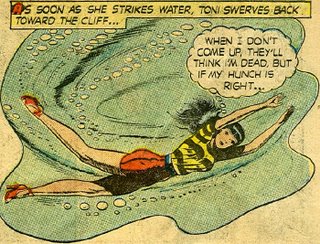
Number 22
Toni Gayle By L. B. Cole. Guns Against Gangsters Number 6, July-August, 1949.
Crime Does Not Pay had issued in a whole genre of comic books when it introduced and popularized the crime comic books of the 1940s and 1950s. They also raised the ire of parents and educators everywhere, who were convinced that crime comic books were turning their kids into juvenile delinquents. Fredric Wertham, M.D., who published his book, Seduction Of The Innocent in 1954, was writing in 1948 about what he perceived as the dangers of crime comic books, and they were under the microscope from several diverse and equally concerned groups.
Some publishers tried to make their products a little more palatable to parents. In this
In reading the story you can see that unlike Charles Biro and Bob Wood's Crime Does Not Pay and Crime And Punishment comics, fewer words were used in Guns Against Gangsters. Where Biro's comics could be almost novelistic in verbiage and length of stories (especially for Golden Age comic books, where 13 pages was a fairly long story), Guns Against Gangsters simplified the writing.
L. B. Cole, who worked for both this magazine and its companion, Criminals On The Run, drew the Toni Gayle lead story in this issue, as well as the second story, "The Gunmaster Gregory Gayle," starring Toni Gayle's dad. Cole also drew the classic cover, which I posted in Pappy's Number 14.
When I read this Toni Gayle story, besides noticing how simple the plot is--some bad guys looking for jewels they tossed at Toni while escaping the Coast Guard--I'm also struck by Toni's pin-up style sex appeal. These comics were being sold to boys, most of them probably in the 10-to-14-year age group, but some older as well, including adults. (Despite the claims of today's comics being for "adults," comic books have always had at least some adult readership.) Almost 60 years later Toni's obvious charms still show very well. In lingo gleaned from Seduction Of The Innocent Toni's breasts would be called "headlights," and they are definitely on high beam throughout the story. I'm also fascinated by how she can dive into the water and come up with hair and makeup--even high heels--still intact and perfect.
L. B. Cole drew, by his estimation, nearly 1,500 covers in his career. He was a decent artist on these inside continuity pages, but it's for his covers he's famous. His ability to make eye-catching poster-like covers sold an awful lot of otherwise mediocre comic books. Except for his loving renditions of sexy Toni, I don't think there's much else about this artwork that would send anyone's pulse racing. But then, maybe that was enough for those readers in 1949 looking for a little something extra for their dime.










No comments:
Post a Comment